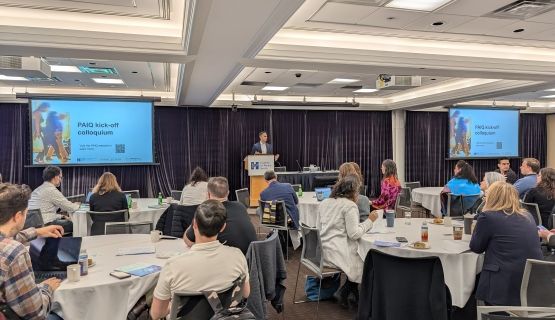Future of work
The world of work in Canada and other industrialized countries is undergoing rapid transformation. Major forces driving change include digital technologies, artificial intelligence, climate change, demographic shifts and more. This change may bring far-reaching social, political and economic consequences for a generation of workers. IWH researchers are exploring the emerging issues posed by some of these trends—on health and safety, on work inequities, and on the inclusion of marginalized groups in the future of work—and seeking policy, system and workplace actions that can be implemented now to help ensure a healthy and inclusive future for all.
Featured

At Work article
AI and job quality project gathers partners to develop roadmap
As artificial intelligence (AI) becomes more integrated into workplaces, a new IWH project wants to ensure that job quality—and the health and safety of workers—remains a top priority.
Published: January 14, 2026

IWH Speaker Series
AI adoption at work: Which worker and occupation groups are most likely to be affected?
Published: November 18, 2025

At Work article
AI and job quality project gathers partners to develop roadmap
Job quality is increasingly recognized as an important factor for workers’ health, safety and wellbeing. As artificial intelligence (AI) becomes more integrated into workplaces, a new project, the Partnership on AI and Quality of work (PAIQ), wants to ensure that job quality—and the health and safety of workers—remains a top priority. The team recently came together to kick off the next seven years of work.
Published: January 2026
Project report
Project report
Work & health 2040: Anticipating changes impacting the futures of occupational health and safety
By 2040, the future of work and health will be shaped by rapid transformations across technology, climate, the economy, politics and society. This evolving landscape will present both urgent challenges and critical opportunities for practitioners and policy-makers promoting the health, safety and wellbeing of the working population. This report applies strategic foresight methods to explore a wide range of plausible futures and their potential implications for workplaces and their workers. It helps to anticipate what’s coming, question assumptions and build more adaptive, equitable and resilient approaches to promoting worker health, safety and wellbeing.
Published: January 2026
Journal article
Journal article
Artificial intelligence in the workplace: a living systematic review protocol on worker safety, health, and well-being implications
Published: Systematic Reviews, December 2025
Journal article
Journal article
Calling it like they see it? Young adults' discourses of employment and labour market inequalities
Published: Equality, Diversity and Inclusion, December 2025
IWH Speaker Series
IWH Speaker Series
AI adoption at work: Which worker and occupation groups are most likely to be affected?
The rapid adoption of artificial intelligence (AI) within Canada’s labour market can drive innovation and raise productivity. But the benefits of AI may vary according to the characteristics of workers and their occupations. In the absence of direct measures, examining the impact of AI on work and workers can be challenging. In this presentation, Dr. Arif Jetha discusses the use of different measures of “AI exposure” as a tool to study the technology’s impact on different groups of workers, who vary according to gender and educational attainment. The study also describes differences in the impact of AI according to occupational differences including job skill requirements and job quality. Insights from this presentation can be used to direct research attention and strategic responses towards occupations and worker groups most likely to be affected by AI.
Published: November 2025
Journal article
Journal article
Strategies for supporting disability-inclusive employment in the future of work
Published: Journal of Occupational Rehabilitation, November 2025

Research Highlights
Mental health of Canadians who work from home no better or worse than those working outside the home
Canadian adults who work from home report the same levels of mental health, life satisfaction and stress as those who work on-site at a workplace, or at no fixed location (on the road). That’s according to a study of survey data from almost 25,000 Canadians in 2022, after work-from-home arrangements became more common.
Published: October 2025

Research Highlights
Which workers and jobs will be most affected by machine learning?
Machine learning is being adopted by more and more Canadian workplaces. Given this technology’s ability to learn, adapt and generate work outputs, it also has the potential to perform job tasks in place of humans. But which workers might be most affected by the use of machine learning? An IWH study explores this question.
Published: July 2025
Journal article
Journal article
Do occupational health and safety tools that utilize artificial intelligence have a measurable impact on worker injury or illness? Findings from a systematic review
Published: Systematic Reviews, July 2025
Journal article
Journal article
Machine learning and the labor market: a portrait of occupational and worker inequities in Canada
Published: Social Science & Medicine, June 2025